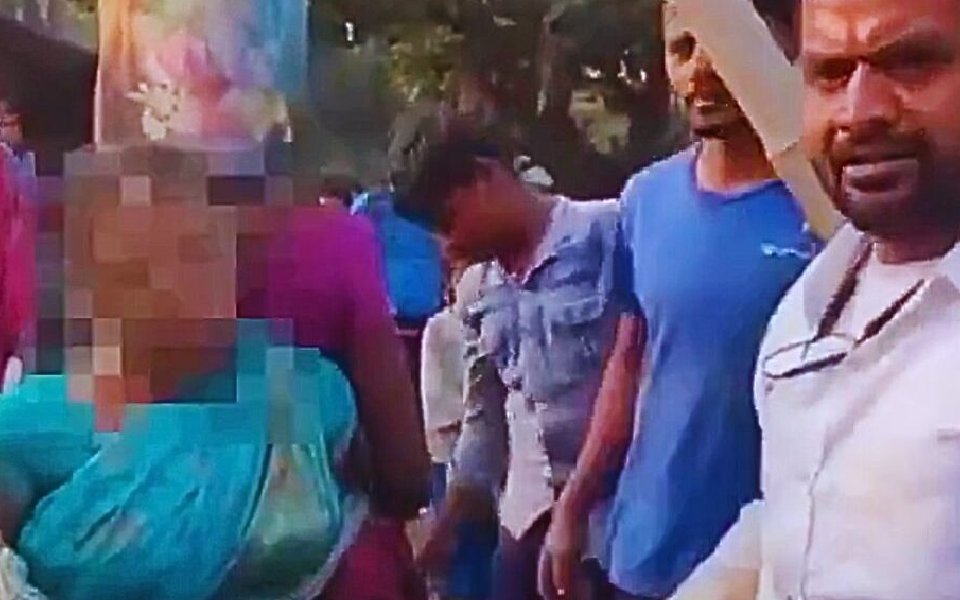Bhubaneshwar: A day after Christmas, on December 26, two tribal women were allegedly tied to a tree and beaten by a mob in the Remuna area of Odisha's Balasore district. The women, accused of attempting to convert a Hindu man to Christianity, were subjected to humiliation and violence, as captured in a viral video that brought the incident to light, reported The Wire.
The victims, identified as Subhasini Singh and Sukanti Singh, were reportedly targeted after visiting Chhankhanpur hamlet in Mukhura village. Subhasini, a Christian from Makhpada village in Nilgiri, allegedly came to meet Gobind Singh, a Hindu tribal man, with the intention of persuading him to convert to Christianity. Sukanti, a local resident and Hindu, was accused of facilitating the visit.
In the video, the women are seen tied to a tree, surrounded by a hostile crowd. One man's remarks accusing them of "destroying Hindu religion and culture" and chants of "Bharat Mata ki Jai" and "Jai Shri Ram" underscore the mob's fury. Subhasini's face was smeared with a cake, which locals claimed had been brought to celebrate a religious conversion.
Subas Mallick, Inspector-in-Charge of Remuna police station, confirmed the incident and said the mob had also humiliated Gobind Singh for his alleged intent to convert. Four individuals, Bapin Nayak, Pitambar Biswal, Prashant Nayak, and Badal Panda—were detained in connection with the assault. Cases have been registered under sections of the Bharatiya Nyay Sanhita (BNS) addressing assault and prevention of atrocities against scheduled tribes, as well as under the Odisha Freedom of Religion Act, 1967, which prohibits forced or induced religious conversions.
However, police later released the detainees after they reportedly expressed regret and reached an "understanding" with the victims. Gobind Singh also allegedly apologized for his intent to change his faith. Despite this, two separate cases remain under investigation.
Reactions to the incident have highlighted concerns about rising vigilantism and threats to vulnerable communities. Odisha Congress spokesperson Amiya Pandab condemned the attack as a shameful reflection of the state’s law and order situation, particularly against tribal women. Former Biju Janata Dal (BJD) MLA Latika Pradhan criticized what she called "vigilante justice," emphasizing that any alleged illegal conversions should be dealt with by law rather than mob action.
The incident has also reignited discussions about communal tensions in Odisha. Balasore, represented in the Lok Sabha by former Union Minister Pratap Sarangi, borders Mayurbhanj, the home district of President Draupadi Murmu, and Keonjhar, Chief Minister Mohan Majhi’s constituency. Both leaders are from tribal communities, underscoring the gravity of such incidents targeting vulnerable groups.
This case comes against the backdrop of Odisha’s history of communal violence, including the 2008 Kandhamal riots, which led to over 30 deaths and widespread displacement of Christians. Then-Chief Minister Naveen Patnaik, now leader of the opposition, severed ties with the BJP in 2009, citing concerns over communal discord.
As authorities probe the latest incident, it raises critical questions about the balance between protecting religious freedom and preventing vigilantism.
Let the Truth be known. If you read VB and like VB, please be a VB Supporter and Help us deliver the Truth to one and all.
Bengaluru (PTI): The Karnataka government has issued directions to municipal corporations across the state to regulate and prohibit feeding pigeons in public places, citing serious public health concerns.
Deputy Secretary to Government V Lakshmikanth has written to the Urban Development Department requesting it to issue directions to the Greater Bengaluru Authority (GBA) and all municipal corporations to take immediate steps to implement the measures.
In an official note dated December 16 issued by the Health and Family Welfare Department and released to the media on Wednesday, the department said uncontrolled feeding of pigeons in public places has resulted in large congregations of birds, excessive droppings and serious health concerns, particularly respiratory illnesses linked to prolonged exposure to pigeon droppings and feathers such as hypersensitivity pneumonitis and other lung diseases.
ALSO READ: Chinese GPS tracker found on seagull near Karwar Coast
"The commissioner, the Greater Bengaluru Authority and the Commissioners and chief officers of other municipal corporations shall take necessary action to mitigate the causes of dangerous disease spread by pigeon and enforce specified guidelines in their respective jurisdiction," the note said.
According to the department, these include a prohibition on feeding pigeons or causing pigeons to be fed in areas where it may cause nuisance or pose a health hazard to the public. Pigeon feeding shall be permitted only in designated areas in a controlled manner, subject to certain conditions.
"The designated areas may be selected in consultation with stakeholders. The responsibility for upkeep of the designated areas and compliance to the directions shall be taken up by some charitable organisation or an NGO. The feeding in designated areas shall be permitted only for some limited hours in the day," it said.
The note further stated that authorised officers of local authorities shall issue on-the-spot warnings and may impose fines for violation of the order, or lodge complaints to prosecute offenders under Sections 271 (Negligent act likely to spread infection of disease dangerous to life) and 272 (Malignant act likely to spread infection of disease dangerous to life) of the Bharatiya Nyaya Sanhita.
It also directed local authorities to conduct public awareness campaigns, including the display of signboards, banners and digital messages, explaining the health hazards associated with pigeon droppings and feathers, the content of the regulatory directions and penalties for violations, and alternative humane methods of bird conservation that do not endanger public health.





